DAY 16: SCIENCE PT3 – FROM PRACTICAL INGENUITY TO SCIENTIFIC DISCOVERY AND INNOVATION
S.T.E.M. is a term used in today’s education effort that stands for Science, Technology, Engineering, and Mathematics. The following selection of African Americans oriented towards science depicts a snippet of the larger group. From healthcare, computer science, and engineering to ecology, architecture, and aerospace engineering, Black people have moved this country forward in its aim to be a world leader in every phase of life. Here’s the good news. Despite the concerted effort of a select few, African American scientists have profoundly impacted our lives, and there is so much more to come. #LetTheTruthBeTold.
We have chosen to celebrate a select few science pioneers for their determination to change the perception of Black peoples contributions and thus change the landscape and future of our country. Today we honor their genius. We must not let their efforts be forgotten or let others bask in the credit of their achievements. Today we change the narrative. #LET THE TRUTH BE TOLD.
“Oceanographers and other notable scientific endeavors”
TWO TOP TIERED SCIENTIST DEDICATED TO MAKING OUR WORLD A BETTER PLACE THROUGH CARING FOR OUR OCEAN LIFE
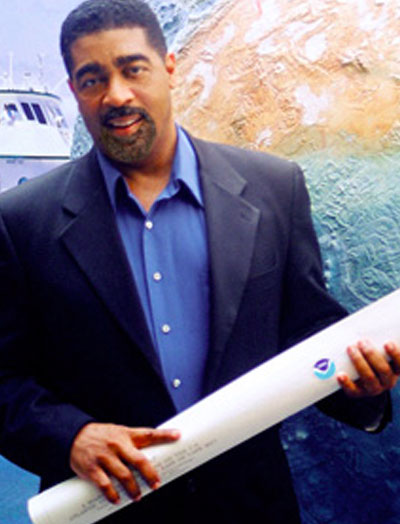
Evan B. Forde 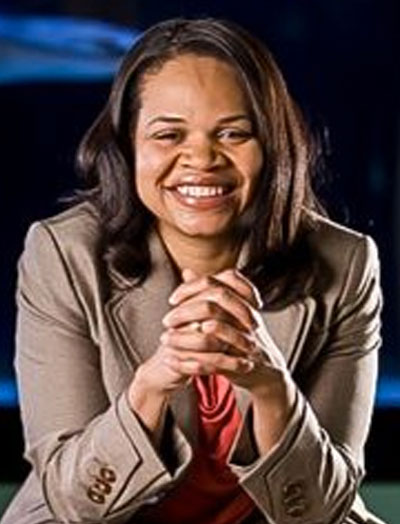
Ashanti Johnson
An internationally recognized oceanographer, Evan B. Forde became the first African American Scientist to complete research dives in a submersible when he journeyed miles underwater in the Nekton Gamma vehicle in 1979. An expert on the formation of submarine canyons, Forde explored the evolution of these striking geologic forms during multiple dive expeditions. More recently, Forde’s research examined how satellite sensors might aid in analyzing the connections between atmospheric conditions, specifically the moisture environment, and hurricane formation.
Born in Miami, Florida on May 11, 1952, Forde spent his childhood in the city. His parents, Samuel and Margaret Forde, were both teachers and, from a young age, Forde had an interest in science. He owned a microscope, telescope, and chemistry set in elementary school and eagerly watched The Undersea World of Jacques Cousteau on television. In high school, Forde had the opportunity to take a course in environmental oceanography, which further piqued his interest in the undersea world. For college, he attended Columbia University in New York City, New York completing a B.S. in geology with an oceanography specialty in 1974. He then continued on to earn a M.S. in marine geology and geophysics, also from Columbia.
Ashanti Johnson is an American geochemist and chemical oceanographer. She is one of the first female African American chemical oceanographers and the first African American to earn a doctoral degree in oceanography from Texas A&M University.
Her areas of research specialization include aquatic radiogeochemistry, professional development of students, and science and engineering diversity-focused initiatives. Her aquatic radiogeochemistry research activities focus on the utilization of various biogeochemical indicators to interpret past events that have impacted the marine, estuarine and freshwater environments in the Arctic, as well as in coastal regions of Georgia, Florida, and Puerto Rico.
Dr. Ashanti Johnson is an international expert and highly accredited STEM speaker, profiled in Wikipedia, several STEM textbooks and various other publications. She is also one of the first African American female Chemical Oceanographers in the country. Dr. Ashanti Johnson’s keynote topics include STEM Professional Development; Diversity and Inclusion; Women in STEM; Faculty Recruitment and Diversity; as well as Workplace and Career Empowerment; Environmental Science; Oceanography, Professional Development of High School, Undergraduate and Graduate Students; Pre-K to 12th grade STEM Learning and Enrichment; Student and Early Career Mentoring; Faculty and Staff Professional Development; Institutional Change; Organizational Leadership and Advancement Convocations.
“Other Notable Black Scientist Cont.”
AUYANNA JOHNSON AND ANTHONY BROWDER
Dr. Ayana Elizabeth Johnson is a marine biologist, policy expert, conservation strategist, and Brooklyn native. She is founder of Ocean Collectiv, a strategy consulting firm for conservation solutions grounded in social justice. She teaches at New York University as an adjunct professor, and volunteered as co-director of partnerships for the March for Science. As executive director of the Waitt Institute, Ayana co-founded the Blue Halo Initiative and led the Caribbean’s first successful island-wide ocean zoning effort. Previously, she worked on ocean policy at the EPA and NOAA, and was recently a TED resident and Aspen Institute fellow. Ayana earned a BA from Harvard University in Environmental Science and Public Policy, and a Ph.D. from Scripps Institution of Oceanography in marine biology.
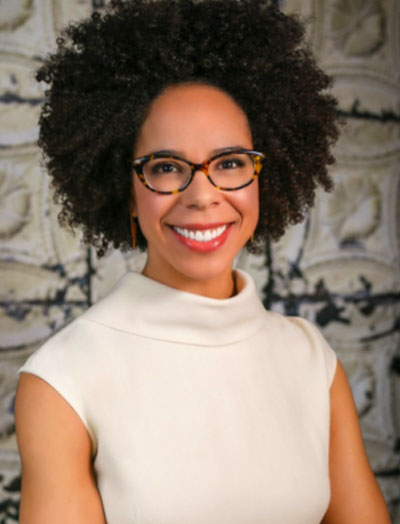
Ayanna Johnson 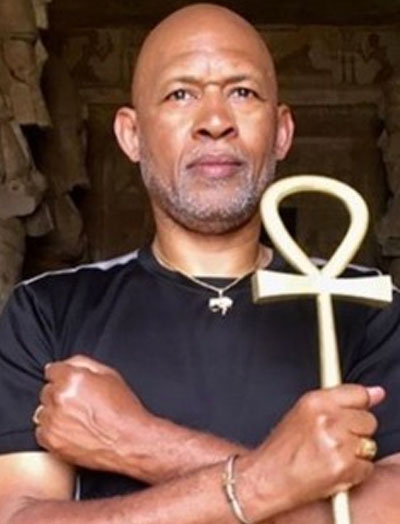
Anthony Browder
Dr. Ayana Elizabeth Johnson is a marine biologist, policy expert, conservation strategist, and Brooklyn native. She is founder of Ocean Collectiv, a strategy consulting firm for conservation solutions grounded in social justice. She teaches at New York University as an adjunct professor, and volunteered as co-director of partnerships for the March for Science. As executive director of the Waitt Institute, Ayana co-founded the Blue Halo Initiative and led the Caribbean’s first successful island-wide ocean zoning effort. Previously, she worked on ocean policy at the EPA and NOAA, and was recently a TED resident and Aspen Institute fellow. Ayana earned a BA from Harvard University in Environmental Science and Public Policy, and a Ph.D. from Scripps Institution of Oceanography in marine biology.
“Over the past decade, we have been able to uncover the hidden histories of people who have been written out of their own history,” said cultural historian, Egyptian archeologist, author and educational consultant, Anthony Browder, on the latest find in Egypt.
“We have raised the profile of African Americans in Egypt and are now seen as archeologists, financiers and tourists. “It’s a major game changer.”
In May 2018, Browder, his daughter Atlantis and the ASA Restoration Project excavation team discovered 2700-year-old, Kushite artifacts that are now installed in the Egyptian Museum in Luxor. He makes history as the first African American to lead and fund an archeological excavation project in Egypt.
“Through our archeological discoveries, we have been able to tell a story of 25th dynasty kings and nobles that has never been told,” said Browder. “And we are able to connect Kushite history with Kemetic history, and the history of civilizations in West Africa.
“We will be producing books and documentaries of our findings for the next 50 years.”
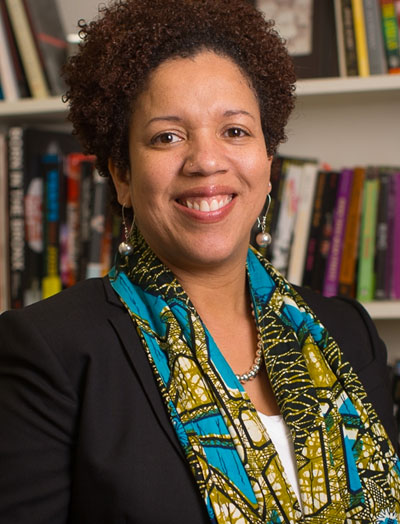
Whitney Battle-Baptiste 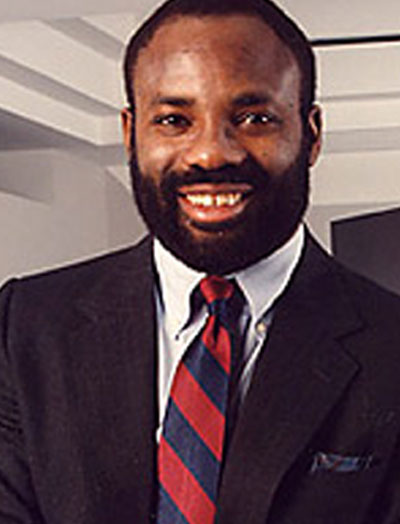
Philip Emeagwali
Whitney Battle-Baptiste, is a historical archaeologist who focuses primarily on the historical intersection of race, class, and gender in the shaping of cultural landscapes across the African diaspora. Her theoretical interests include Black feminist theory, African American material and expressive culture, and critical heritage studies. Her work spans a variety of historic sites in the Northern and Southern United States, including the home of Andrew Jackson in Nashville, Tennessee; Rich Neck Plantation in Williamsburg, Virginia; the Abiel Smith School in Boston, Massachusetts; and the W. E. B. Du Bois Homesite in Great Barrington, Massachusetts. Her latest research is a community-based archaeology project at the Millars Plantation site on the island of Eleuthera in the Bahamas.
Whitney Battle-Baptiste, professor of anthropology and director of the W. E. B. Du Bois Center, has been named a Chancellor’s Leadership Fellow in the Office of Equity and Inclusion.
Organized by the Office of Faculty Development, Chancellor’s Leadership Fellowships seek to cultivate future campus leaders by offering a half-time, one-year, temporary appointment to an administrative area on campus. Professor Battle-Baptiste will be working with Nefertiti Walker, interim vice chancellor for diversity, equity and inclusion, to roll out “Black Presence at UMass,” an initiative dedicated to celebrating the collective impact of African American and Black faculty, staff, students, alumni and other community members.
“Dr. Battle-Baptiste brings a wealth of institutional knowledge through her leadership of the W. E. B. Du Bois Center, and related experiences rooted in her research expertise,” says Walker. “We are confident that she will provide the leadership needed to successfully launch the Black Presence initiative, and we are excited for the year ahead.”
Battle-Baptiste is a historical archaeologist, and her research focuses on the historical intersection of race, class, and gender in the shaping of cultural landscapes across the African diaspora. She has led the Du Bois Center since 2015.
It’s hard to say who invented the Internet. There were many mathematicians and scientists who contributed to its development; computers were sending signals to each other as early as the 1950s. But the Web owes much of its existence to Philip Emeagwali, a math whiz who came up with the formula for allowing a large number of computers to communicate at once.
Emeagwali was born to a poor family in Akure, Nigeria, in 1954. Despite his brain for math, he had to drop out of school because his family, who had become war refugees, could no longer afford to send him. As a young man, he earned a general education certificate from the University of London and later degrees from George Washington University and the University of Maryland, as well as a doctoral fellowship from the University of Michigan.
At Michigan, he participated in the scientific community’s debate on how to simulate the detection of oil reservoirs using a supercomputer. Growing up in an oil-rich nation and understanding how oil is drilled, Emeagwali decided to use this problem as the subject of his doctoral dissertation. Borrowing an idea from a science fiction story about predicting the weather, Emeagwali decided that rather than using 8 expensive supercomputers he would employ thousands of microprocessors to do the computation.
Listen as Shuler King sheds a little Humor on John Wesley Gilbert’s Discovery in 1890 of the ancient Greek city of Eretria
John Wesley Gilbert was and educator, a missionary, and the first African American archaeologist. He was also the first graduate of Paine College, and the first African American to receive a master’s degree from Brown University.
Gilbert was born free on July 6, 1863 in Hephzibah, Georgia, to Gabriel and Sarah, farm hands born into slavery. In his youth, Gilbert attended the local public schools while working as a farm hand. He first enrolled into Augusta Institute in 1878 and remained there for two years, before he began teaching at Ware High School, Richmond, Georgia, in 1880. He remained there until 1883. Gilbert then enrolled at the new Paine College in Augusta, becoming the institution’s first student. He attended from 1884 to 1886 and studied Greek and other foreign languages. He then transferred to the junior class of Brown University, in Rhode Island. He was one of the first ten black students at the university and the third African American to receive his A.B. in 1888.
Later in 1888 Gilbert moved back to Georgia, and began to court Osceola K. Pleasant, a teacher and graduate of Paine College and Fisk University. The couple married in 1889 and had four children together. While attending Brown University, Gilbert received a scholarship to attend the American School of Classics, in Athens, Greece. He traveled there to begin his studies in 1890. He was the first African American to attend the school and participated in archaeological fieldwork during his year of attendance. During one of those excavations, Gilbert found walls, gates, and pillars that lead to the discovery of the ancient Greek city of Eretria. Due to his discoveries he created the first map of the area. When Gilbert returned to Brown in 1891, he focused his studies on archaeology, and became the first African American to receive an advanced degree from the institution, earning his master’s degree in Archaeology in 1891.
“Covid-19 Vaccine Research Scientist”
MEET THE BLACK FEMALE SCIENTIST ON THE FOREFRONT OF THE COVID-19 VACCINE DEVELOPMENT
According to her biography, Dr. Kizmeekia “Kizzy” Corbett received a B.S. in Biological Sciences, with a secondary major in Sociology, in 2008 from the University of Maryland – Baltimore County, where she was a Meyerhoff Scholar and an NIH undergraduate scholar. She then enrolled at the University of North Carolina at Chapel Hill, where she obtained her Ph.D. in Microbiology and Immunology in 2014.
A viral immunologist by training, Dr. Corbett is known for using her expertise to propel novel vaccine development for pandemic preparedness. Appointed to the VRC in 2014, her work focuses on developing novel coronavirus vaccines.
Dr. Corbett has 15 years of expertise studying dengue virus, respiratory syncytial virus, influenza virus, and coronaviruses. Along with her research activities, Dr. Corbett is an active member of the NIH Fellows Committee and an avid advocator of STEM education and vaccine awareness in the community.
“History books will celebrate the name and achievements of Dr. Kizzmekia Corbett, the Black Woman who was the leader in developing the COVID-19 Vaccine,” Barbara Arnwine, president and founder of Transformative Justice Coalition, wrote on Twitter. “She developed the specific scientific approach to mitigating the coronavirus.”
“History books will celebrate the name and achievements of Dr. Kizzmekia Corbett, the Black Woman who was the leader in developing the COVID-19 Vaccine,”
BARBARA ARNWINE PRESIDENT AND FOUNDER OF THE TRANSFORMATIVE JUSTICE COALITION
Content provided courtesy of History.com, Britannica.com and Wikipedia.com, Biographies.com, Blackpast.com, CBS,com, drashantijohnson.com, notablebiographies.com, content.time.com, umass.edu, and the lasentinel.net. All Rights Reserved.


